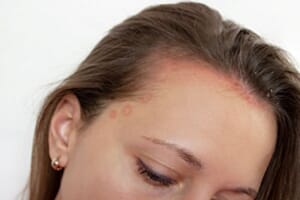Psoriasis is a chronic skin condition that once it has occurred tends to reoccur throughout a lifetime. Psoriasis can be triggered at different ages from teen years all the way to older age.
However, depending at what age you are, can change the way you need to deal with psoriasis as although the causes of the underlying condition remains the same, the actual skin itself alters with age producing different symptoms and needing different treatments.
For example, what works well for younger psoriasis sufferers with typically normal or oily skin doesn’t necessarily work for older more fragile and drier skin. Even gentle scrubs suitable for younger stronger skin can be too abrasive older thinner skin. And while some moisturizers specifically target sensitive skin, some sufferers might have a need for a moisturizer that is especially rich and hydrating, as well, while others need a lighter less greasy serum type application. What is suitable for psoriasis sufferers of all ages? As a general rule all products used on skin prone to psoriasis should be hypoallergenic, alcohol-free, fragrance-free and suitable for sensitive skin. Moisturizers with ceramides, lipids and hyaluronic acid often are preferable because they help keep the upper layer of the epidermis well hydrated. These components are naturally present in skin and are essential for normal function. In addition, any products containing prebiotics that are suitable for sensitive skin can help repair the skin barrier and lock in moisture. Also crucial for keeping skin prone to psoriasis protected is sunscreen. While a good dose of vitamin D from sunshine can be beneficial to those with psoriasis, a high SPF sunscreen for the whole body is vital as sunburn or sun damage to infected and active psoriatic skin can cause further damage and inflammation to already vulnerable skin. However, SPF creams should be preferably mineral-based and tested for use on sensitive skins. Chemical SPF’s can irritate fragile psoriasis-prone skin and even trigger flare ups. But while these general psoriasis skincare rules apply, tailoring your regimen to your needs as you age can be tricky. What worked for you in your teens and 20s likely to be different to what your skin needs in your 30s, 40s and beyond. Here’s a look at the role that psoriatic disease plays at different ages, what accompanying skin issue you may encounter and the ingredients and products to use (and avoid) for the best care for your skin as you age with psoriasis. Teens & 20s Common issues: Oily scalp, face and body acne The treatments for acne and psoriasis are quite different, but it’s likely that you will probably need to use both. The key is to take huge care about what acne products you use. Common teen acne products tend to contain harsh anti-bacterial agents, namely benzoyl peroxide, which can be irritating even to strong skin, and can be damaging for psoriasis prone skin. Consider using formulations that are less irritating to the skin and do not contain harsh anti-bacterial agents. Modern acne products fight bacterial by feeding good skin flora and reduce levels bad skin bacteria. This is a more natural and less harsh way to deal with bacterial build up than simply blitzing bad bacteria with chemical anti-bacterial products, which can leave skin dry and irritated. Higher levels of good skin flora not only fight acne but also strengthens skin and improves flexibility. Sebum purifiers as opposed to sebum inhibitors are a better way to tackle acne on psoriasis-prone skin. These products help keep sebum production clear to prevent pore blockages while letting the skin continue to produce sebum which can help keep psoriatic skin stay more moisturised and flexible. Light and not too abrasive exfoliating products can also benefit younger psoriatic skin to help slew off scales and roughness. Use products that contain only natural exfoliants and have a skin softening as well as exfoliating action Many younger psoriasis sufferers have redness and scale in their scalp and along their hairline, which can be due to active oil glands and hormonal changes. But using an anti-dandruff shampoo meant for fungal dandruff can be a huge mistake as they really irritate scalp psoriasis. In addition, hairspray and hair gels should be avoided as their sticky chemical composition can clog hair pores and increase bacterial build up on open psoriatic wounds as well as exacerbate symptoms due to high chemical contents. Most fake tan products have a high potential to make psoriatic symptoms worse so they are best avoided at all times. A light and carefully controlled natural tan is better for psoriatic skin. 10-15 minutes a day sun exposure is recommended to build up a light tan and help give psoriatic skin a daily safe dose of vitamin D. 30s & 40s Common issues: Sun damage, dryness, age spots and wrinkles, uneven skin tones Retinoids are the single-best thing for anti-aging because they keep skin smooth, lighten brown spots and diminish wrinkles. However, prescription-strength retinols can sometimes be too harsh for patients suffering from psoriasis. Use a gentler over-the-counter retinoid usually for use only overnight. As skin ages, it gets more fragile and thinner so sun damage becomes a bigger issue for ageing psoriatic skin. Wearing a SPF daily becomes more important with older skin. But SPF’s with chemical sunscreens in them can do more harm than good to psoriatic skin. Opt for either SPF creams or concealers containing pure mineral SPF’s, either zinc or titanium dioxide. Zinc can also help reduce inflammation. Often a tinted concealer or tinted moisturiser containing mineral sunblock is better as it masks the white tint that most mineral sun blocks have, and can also concealer psoriatic lesions and redness. Aim for a minimal mineral block of SPF20.
Look for cosmetics and products containing prebiotics suitable for sensitive skin. Prebiotics help feed good skin flora which can reinforce the skin barrier to lock in moisture and improve skin flexibility as well as even out skin tone. Avoid exfoliating products as older skin becomes more fragile. Opt instead for cream cleansers for cleansing and cleaning skin that do not contain detergents or require water. Cleansing balms can also be very beneficial for older psoriatic skin. Avoid toners as they tend to have a drying effect on skin. Switch to mineral based cosmetics and avoid the use of mattifying powders or foundations which can be drying to older skin. Switch instead to tinted moisturisers or lighter concealers with moisturising and protective ingredients. 50s & beyond Common issues: Hair and scalp changes, use of cosmetic procedures, dry skin. Over 50 with psoriasis should switch to greasier emollient type creams suitable for skin prone to psoriasis or very hydrating serums or skin oils as opposed to gels or lotions and apply them twice daily. These formulations work better for dryer older skin prone to psoriasis. Gels can be very drying due to their higher alcohol content, and lotions have fewer emollients in them. People with psoriasis over the age of 50 should also turn to skin products. containing a high content of hyaluronic acid. As we age, the body decreases production of hyaluronic acid, which makes replacing it vital to maintaining healthy skin. Serums containing pure hyaluronic acid are helpful when layered underneath daily emollient creams for double moisturisation. Many over-50 people colour their hair, but the dye is a potential irritant to the scalp and can exacerbate scalp psoriasis. Darker tones using natural vegetable based hair dyes suitable for sensitive skin are a better option and patch tests should always be carried out before using on the entire scalp. Any hair dyes containing bleach should be avoided. A helpful tip is to avoid shampooing your hair within 24 hours of colouring to help retain scalp moisture. Apply a rich mask and sleep with it overnight before colouring your hair as this will nourish the scalp. 50 and beyond is the age at which many people begin considering cosmetic procedures. If you are considering cosmetic surgery or laser procedures and have psoriasis, first consult with your doctor as any trauma to psoriatic skin can trigger a flare up. But that is not to say these procedures cannot be enjoyed by people with psoriasis. As a general guide, micro injections of botox, hyaluronic acid and vitamins to small specific sites on the skin are less problematic than all over laser treatments or chemical peels. Practice regular nourishing face masks with naturally intensely moisturising ingredients. Consider taking a daily Omega oil supplement to help support and maintain natural oils in skin.







